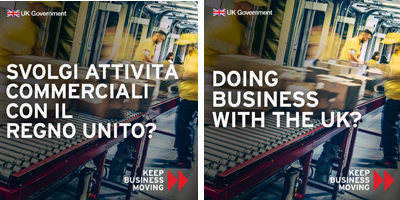
Qui di seguito troverete informazioni relative all’accordo sugli scambi e la cooperazione tra il Regno Unito e l’UE e su come le imprese potranno prepararsi e adattarsi alla nuova relazione commerciale. La comunicazione è principalmente rivolta ad aziende con sede in UK, ma contiene indicazioni molto utili anche per una diffusione più ampia dato che molti di voi risiedono nel Regno Unito.
The UK and EU have agreed a Trade and Cooperation Agreement governing future trade relations from 1st January 2021, that will see no tariffs or quotas on the movement of goods produced between the UK and the EU.
Further details and a summary explainer document are available here.
Your business has to make a number of changes to ensure continued flow of people, data, goods and services between the UK and the EU.
Businesses should take action as the UK is no longer in the single market or the customs union.
What guidance is available?
The best place for businesses to get support and information about the changes is at GOV.UK/transition, (UK based) or GOV.UK/EUbusiness (EU based). These sites include:
▪ A transition checker tool, so businesses can get personalised results about the specific actions they need to take;
▪ The latest news from the Government.
Additional key Government advice:
▪ The Border Operating Model is a guide to how the border with the EU works. See the ‘Guide to changes at the border’ for a summary.
▪ Businesses can sign up to Business Readiness bulletins produced by BEIS here.
The Devolved Administrations have also published guidance:
▪ Scotland
▪ Wales
▪ Northern Ireland
Actions for businesses to take now
Businesses that import and export goods: To continue to trade with the EU, you will need to follow new rules for exporting, including changes to processes and licensing. Visit GOV.UK/transition to find out what you need to do. You should:
▪ get an EORI number if you do not already have one
▪ decide how you want to make customs declarations and whether you need to get someone to deal with customs for you.
You can find more information on exporting from the UK step by step here, and importing into the UK step by step here. You can find webinars aimed at organisations that trade with the EU here and more info on placing manufactured goods on the market in Great Britain here.
Businesses that have staff working between the UK and EU: If you travel to the EU for work purposes, you may need a visa or work permit. Visit GOV.UK/transition or this page to find out what to do.
Businesses that deliver services between the UK and the EU: Ensure your staff are able to continue to practise and provide services to clients in the UK by ensuring their professional qualification(s) are recognised by their professional body in the UK. Go to GOV.UK/transition to find out what to do.
You can find more info here.
Businesses that hire staff from the EU: Free movement has ended and the UK is introducing a new
points-based immigration system. The way you hire from the EU has changed. If you want to hire
anyone from outside the UK, you must be a Home Office licenced sponsor. This includes recruiting people from the EU.
Anyone coming to the UK to work will need a job offer from a licenced sponsor in advance, and will need to meet certain skills and salary criteria. Find out more on GOV.UK/transition. You can find an introduction for employers here.
EU citizens you already employ in the UK: Inform your current EU employees about the EU Settlement
Scheme. EU citizens and their family members living in the UK should apply to the EU Settlement scheme.
You can find more information here and further details about applying for the Settlement scheme here.
Travelling to the EU: There are new rules for travel to Europe. Things you may need to do before you travel include:
▪ checking the validity of your passport;
▪ getting travel insurance;
▪ checking you have the right driving documents;
▪ checking roaming policies with your mobile provider before travelling.
More info here.
Continue living and working in the EU: Living and working in the EU, EEA EFTA, Switzerland and
Ireland depends on the rules in that country. You may need to take action such as:
▪ registering or applying for residency;
▪ checking that you are covered for healthcare;
▪ exchanging your UK driving licence for a licence issued by the EU country where you live.
More info here.
Businesses that transfer data between the UK and the EU: If you receive personal data from the EU for business use, you should check the current guidance on using personal data in your business or organisation. Find out more at GOV.UK/transition and here.
Check out the following links for sector specific information:
Professional and Business Services
As always, you can get in touch with us at DIT.Italy@fcdo.gov.uk
